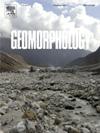Pulsed uplift of the South Tianshan since the Late Miocene indicated by the linear inversion on river longitudinal profiles
IF 3.1
2区 地球科学
Q2 GEOGRAPHY, PHYSICAL
引用次数: 0
Abstract
The early Cenozoic collision and subsequent continuous convergence between the Indian and Eurasian plates reactivated the Tianshan orogen in the Central Asia and caused multistage uplift of the mountain range. The modern Tianshan, with high mountain peaks of >7000 m, forms very prominent topography that profoundly affects the regional tectonics and climate. However, the late Cenozoic uplift process and topography growth of the South Tianshan remain controversial. River longitudinal profile inversion provides a distinctive way to reveal rock uplift history since the late Cenozoic. In this study, we presented linear inversion on river longitudinal profiles of four drainage basins originating from high mountains in the South Tianshan. The inversion results from two basins in the northern flank show fast and continuous increases in the uplift rates from about 0.1–0.2 mm/a to 0.6–1.0 mm/a since 4 Ma. While in the southern flank, the uplift rates of the two basins increased gradually from about 0.1 mm/a to 0.2 mm/a before 10 Ma and from 0.2 mm/a to 0.4 mm/a around 10 Ma and 6 Ma, respectively. Our results combined with recently published chronological data in this region indicate that the South Tianshan experienced a pulsed tectonic uplift process since the Late Miocene. Moreover, the pulsed tectonic uplift should lead to an elevated South Tianshan during 6–4 Ma, coinciding well with the ∼5.3 Ma extreme aridification in the Tarim Basin, thus supporting that the rain shadow effect caused by high topography of South Tianshan is a critical reason for aridification.
河流纵剖面线性反演显示南天山自晚中新世以来的脉冲式隆起
新生代早期印度板块和欧亚板块之间的碰撞以及随后的持续辐合重新激活了中亚地区的天山造山带,并造成了该山脉的多级隆升。现代天山的山峰高达 7000 米,形成了非常突出的地形,对区域构造和气候产生了深远的影响。然而,新生代晚期南天山的隆升过程和地形发育仍存在争议。河流纵剖面反演为揭示新生代晚期以来的岩石隆升史提供了一种独特的方法。在本研究中,我们对发源于南天山高山的四个流域的河流纵剖面进行了线性反演。北翼两个盆地的反演结果表明,自4Ma以来,隆升速率从约0.1-0.2 mm/a快速持续增加到0.6-1.0 mm/a。而在南翼,两个盆地的隆升速率在10Ma以前从约0.1 mm/a逐渐增加到0.2 mm/a,在10Ma和6Ma左右分别从0.2 mm/a增加到0.4 mm/a。我们的研究结果与该地区最近发表的年代学数据相结合,表明南天山自晚中新世以来经历了一个脉冲式的构造抬升过程。此外,脉冲式构造抬升应导致南天山在6-4Ma期间抬升,这与塔里木盆地5.3Ma∼5.3Ma的极端干旱化非常吻合,从而支持了南天山高地形造成的雨影效应是干旱化的关键原因。
本文章由计算机程序翻译,如有差异,请以英文原文为准。
求助全文
约1分钟内获得全文
求助全文
来源期刊

Geomorphology
地学-地球科学综合
CiteScore
8.00
自引率
10.30%
发文量
309
审稿时长
3.4 months
期刊介绍:
Our journal''s scope includes geomorphic themes of: tectonics and regional structure; glacial processes and landforms; fluvial sequences, Quaternary environmental change and dating; fluvial processes and landforms; mass movement, slopes and periglacial processes; hillslopes and soil erosion; weathering, karst and soils; aeolian processes and landforms, coastal dunes and arid environments; coastal and marine processes, estuaries and lakes; modelling, theoretical and quantitative geomorphology; DEM, GIS and remote sensing methods and applications; hazards, applied and planetary geomorphology; and volcanics.
 求助内容:
求助内容: 应助结果提醒方式:
应助结果提醒方式:


